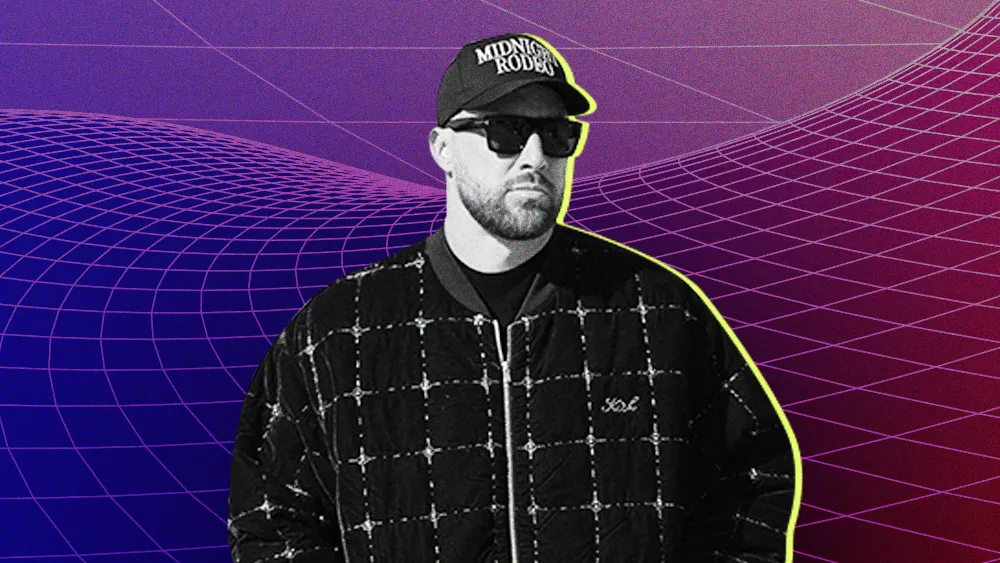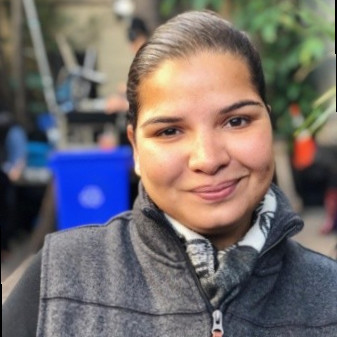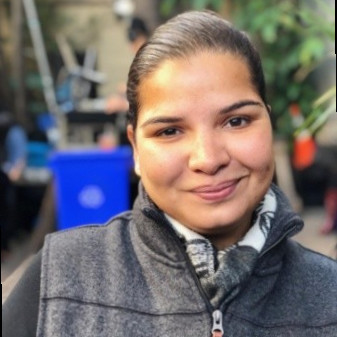What recruiters can learn from Travis Kelce’s expert approach to ‘landing the right match’

Key Points
The public courtship of Taylor Swift by Travis Kelce is viewed by one talent leader as a masterclass in modern recruiting.
Bella Bayma, Manager of Recruiting Operations & Enablement at Contentful, argues that the “Kelce Playbook” demonstrates the perseverance and authenticity required to attract elite candidates.
While culture is used for attraction, a company must prove it’s authentic with radical transparency, offering candidates an unscripted “buddy lunch” with a potential teammate.
Bayma champions using AI to remove biased language from job descriptions, arguing that a demonstrated commitment to diversity is the most meaningful indicator of a healthy culture.
It's so similar to how we pursue high-value candidates. The way Travis got Taylor's attention is such a great example of how perseverance and leading with authenticity can result in a big win.

Bella Bayma
Manager, Recruiting Operations & Enablement
Contentful
When Travis Kelce took to his podcast to publicly court Taylor Swift, it was seen as a charming, long-shot attempt at romance. But for leaders in the trenches of the corporate talent wars, it was something else entirely: a masterclass in modern recruiting. As companies struggle to capture the attention of in-demand, elite talent, the playbook for sourcing and securing them may not be found in an HR manual, but in the biggest pop culture story of the year.
We spoke with Bella Bayma, Manager of Recruiting Operations & Enablement at digital experience platform Contentful. As a global talent operations leader with a decade of experience scaling high-performing teams and a lifelong fan of the Kansas City Chiefs, Bayma argued that the strategies behind attracting top-tier candidates have more in common with Kelce’s public pursuit than most leaders realize. For her, the pop culture moment was a perfect case study in the perseverance and authenticity required to lure top talent to your side.
The Kelce playbook: “As a recruiter, I can’t believe Travis went on his podcast and said ‘Look, I want to meet you,'” said Bayma. “It’s so similar to how we pursue high-value candidates. The way Travis got Taylor’s attention is such a great example of how perseverance and leading with authenticity can result in a big win.”
A workplace unifier: “On the day the engagement was announced, we barely got anything done. Every conversation was about the engagement,” she said, pointing to the role of pop culture as a powerful unifying force in the workplace, creating a rare moment of shared conversation that transcended roles and hierarchies. “Even my Chief People Officer, who doesn’t know a thing about Travis or Taylor, talked about it in a meeting. It really bridged a lot of generations together.” Bayma and her coworkers aren’t alone. BambooHR’s new data at work report on the Swift Shift, found that 22% of employees heard about Swift’s engagement while at work.
She explained that while a consistent, skills-based process is non-negotiable for fair evaluation, a company’s culture is its primary tool for attraction. It’s what makes a candidate want to join in the first place.
The lure of strong culture: “You want a candidate to envision themselves being part of a winning team,” Bayma said. “Choosing a job is a really big decision. It can be something really great, but it can also potentially be catastrophic when it’s not the right fit.” Beyond the burnout and mental health toll of a tense workplace, the disruption of uprooting one’s life for a role that doesn’t pan out underscores just how high the stakes truly are.
Her team’s solution is a “buddy lunch,” a practice that empowers the candidate to make a fully informed decision. After an offer is extended, the candidate is connected with a potential future teammate for an unscripted, unmonitored conversation. It’s less like a formal interview and more like a first date—an early chance to test chemistry before committing to something bigger.
The buddy lunch: “There’s no pressure, no evaluation. It’s just a chance for the candidate to ask questions about the offer and about our culture,” Bayma said. “The goal isn’t to hear from someone whose job is to sell the company, but from a coworker who truly lives the role. That’s where the real nuances come through, like the reality of late nights or the freedom to take Friday afternoons off. Those details that matter when deciding whether to join a team.”
For Bayma, the most meaningful indicators of a healthy culture are not found in office perks, but in a demonstrated commitment to diversity and inclusion. This commitment, she argued, must be embedded in the very first touchpoint: the job description.
Prioritizing inclusivity: “I use ChatGPT to help flag language in job descriptions that might unintentionally exclude certain candidates,” she explained. “We also highlight inclusive benefits—like support for women or adoption—because it shows that we welcome and support everyone. We need diversity, so we need to prioritize diverse support.”
Culture in context: Different geographies have different pop culture trends—although some stories truly are global—and a diverse workforce means learning to navigate them. What feels niche in one region may be a source of pride in another, creating fun opportunities to learn, connect, and spark conversation. “I try to be in the know because I want to be able to talk to anyone. It’s a great way to connect, and it can be so fun to discover what resonates in countries outside your own.”
Ultimately, all of these strategies rest on a simple human principle: a job change can alter the course of a person’s life, and candidates need to be able to say ‘yes’ with conviction. Bayma stressed that companies must treat that responsibility with the seriousness it deserves.
“They’re making really big changes. Some people are relocating to a new city or even another country, uprooting their life for the job. It needs to be right for them.”
You want a candidate to envision themselves being part of a winning team. Choosing a job is a really big decision. It can be something really great, but it can also potentially be catastrophic when it's not the right fit.

Bella Bayma
Manager, Recruiting Operations & Enablement
Contentful
You want a candidate to envision themselves being part of a winning team. Choosing a job is a really big decision. It can be something really great, but it can also potentially be catastrophic when it's not the right fit.

Bella Bayma
Manager, Recruiting Operations & Enablement
Contentful
Related articles
TL;DR
The public courtship of Taylor Swift by Travis Kelce is viewed by one talent leader as a masterclass in modern recruiting.
Bella Bayma, Manager of Recruiting Operations & Enablement at Contentful, argues that the “Kelce Playbook” demonstrates the perseverance and authenticity required to attract elite candidates.
While culture is used for attraction, a company must prove it’s authentic with radical transparency, offering candidates an unscripted “buddy lunch” with a potential teammate.
Bayma champions using AI to remove biased language from job descriptions, arguing that a demonstrated commitment to diversity is the most meaningful indicator of a healthy culture.

Bella Bayma
Contentful
Manager, Recruiting Operations & Enablement

Manager, Recruiting Operations & Enablement
When Travis Kelce took to his podcast to publicly court Taylor Swift, it was seen as a charming, long-shot attempt at romance. But for leaders in the trenches of the corporate talent wars, it was something else entirely: a masterclass in modern recruiting. As companies struggle to capture the attention of in-demand, elite talent, the playbook for sourcing and securing them may not be found in an HR manual, but in the biggest pop culture story of the year.
We spoke with Bella Bayma, Manager of Recruiting Operations & Enablement at digital experience platform Contentful. As a global talent operations leader with a decade of experience scaling high-performing teams and a lifelong fan of the Kansas City Chiefs, Bayma argued that the strategies behind attracting top-tier candidates have more in common with Kelce’s public pursuit than most leaders realize. For her, the pop culture moment was a perfect case study in the perseverance and authenticity required to lure top talent to your side.
The Kelce playbook: “As a recruiter, I can’t believe Travis went on his podcast and said ‘Look, I want to meet you,'” said Bayma. “It’s so similar to how we pursue high-value candidates. The way Travis got Taylor’s attention is such a great example of how perseverance and leading with authenticity can result in a big win.”
A workplace unifier: “On the day the engagement was announced, we barely got anything done. Every conversation was about the engagement,” she said, pointing to the role of pop culture as a powerful unifying force in the workplace, creating a rare moment of shared conversation that transcended roles and hierarchies. “Even my Chief People Officer, who doesn’t know a thing about Travis or Taylor, talked about it in a meeting. It really bridged a lot of generations together.” Bayma and her coworkers aren’t alone. BambooHR’s new data at work report on the Swift Shift, found that 22% of employees heard about Swift’s engagement while at work.
She explained that while a consistent, skills-based process is non-negotiable for fair evaluation, a company’s culture is its primary tool for attraction. It’s what makes a candidate want to join in the first place.
The lure of strong culture: “You want a candidate to envision themselves being part of a winning team,” Bayma said. “Choosing a job is a really big decision. It can be something really great, but it can also potentially be catastrophic when it’s not the right fit.” Beyond the burnout and mental health toll of a tense workplace, the disruption of uprooting one’s life for a role that doesn’t pan out underscores just how high the stakes truly are.

Bella Bayma
Contentful
Manager, Recruiting Operations & Enablement

Manager, Recruiting Operations & Enablement
Her team’s solution is a “buddy lunch,” a practice that empowers the candidate to make a fully informed decision. After an offer is extended, the candidate is connected with a potential future teammate for an unscripted, unmonitored conversation. It’s less like a formal interview and more like a first date—an early chance to test chemistry before committing to something bigger.
The buddy lunch: “There’s no pressure, no evaluation. It’s just a chance for the candidate to ask questions about the offer and about our culture,” Bayma said. “The goal isn’t to hear from someone whose job is to sell the company, but from a coworker who truly lives the role. That’s where the real nuances come through, like the reality of late nights or the freedom to take Friday afternoons off. Those details that matter when deciding whether to join a team.”
For Bayma, the most meaningful indicators of a healthy culture are not found in office perks, but in a demonstrated commitment to diversity and inclusion. This commitment, she argued, must be embedded in the very first touchpoint: the job description.
Prioritizing inclusivity: “I use ChatGPT to help flag language in job descriptions that might unintentionally exclude certain candidates,” she explained. “We also highlight inclusive benefits—like support for women or adoption—because it shows that we welcome and support everyone. We need diversity, so we need to prioritize diverse support.”
Culture in context: Different geographies have different pop culture trends—although some stories truly are global—and a diverse workforce means learning to navigate them. What feels niche in one region may be a source of pride in another, creating fun opportunities to learn, connect, and spark conversation. “I try to be in the know because I want to be able to talk to anyone. It’s a great way to connect, and it can be so fun to discover what resonates in countries outside your own.”
Ultimately, all of these strategies rest on a simple human principle: a job change can alter the course of a person’s life, and candidates need to be able to say ‘yes’ with conviction. Bayma stressed that companies must treat that responsibility with the seriousness it deserves.
“They’re making really big changes. Some people are relocating to a new city or even another country, uprooting their life for the job. It needs to be right for them.”




